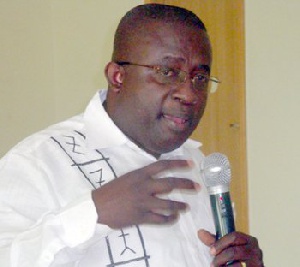- Home - News
- TWI News | TV
- Polls
- Year In Review
- News Archive
- Crime & Punishment
- Politics
- Regional
- Editorial
- Health
- Ghanaians Abroad
- Tabloid
- Africa
- Religion
- Election 2020
- Coronavirus
- News Videos | TV
- Photo Archives
- News Headlines
- Press Release
Business News of Thursday, 12 September 2013
Source: Daily Guide
Ghana now unattractive – Dr Tony Aubynn
The Chief Executive Officer (CEO) of the Ghana Chamber of Mines, Dr Tony Aubynn says the current ‘uncompetitive’ fiscal regime in Ghana is putting unnecessary stress on mining companies.
The development, he said, has drastically reduced investments in the mining industry over the past few years since multinational mining companies do not find Ghana conducive enough to operate.
The mining sector in the country is choked by high and increasing service fees and charges from the Metropolitan/Municipal and District Assemblies (MMDAs) for services rendered to mining companies, coupled with the high cost of electricity and labour costs, among others, according to the CEO.
Dr Aubynn, who was interacting with the Brong Ahafo Regional Press Corps in Sunyani, said government wants to squeeze abnormal revenue from the mining sector with the introduction of numerous taxes.
He said the uncompetitive fiscal regime has been worsened by the recent decline in gold prices which would have serious ramifications for stakeholders.
The issue is not so much about declining gold price, but about cost of operation.
Dr Aubynn pointed out that the mineral royalty has been revised from three percent to six percent to a flat rate of five percent in 2011, representing about a 66 percent increase.
He said corporate tax component has also been increased from 25 percent to 35 percent in 2012, representing a 40 percent increase.
The current unfavourable fiscal environment and declining gold price in Ghana has seen mine workers being shown the exit while capital projects are being stopped, and suppliers of raw materials are being pressurized to reduce prices, he said.
The Chamber of Mines CEO disclosed that the mining sector is the number one taxpayer and highest contributor to Ghana Revenue Authority (GRA)’s domestic collections having contributed about GH¢1.46 billion, which represents 27.04 percent of GRA’s total direct taxes in 2012.
The industry also paid GH¢893.77 million in corporate tax to the GRA, representing 36.98 percent of the total company tax collection in 2012.
Dr Aubynn also touched on the recent hullabaloo that multinational mining companies send about 80 percent of their total revenue out of the country.
According to him, the allegations were false since available records from the Bank of Ghana (BoG) and the Statistical Service of Ghana suggest the contrary.
“Mining companies returned about USD 3.2 billion, representing 73 percent of their mineral revenue through the BoG and the commercial banks in 2012 against the statutory requirement of a minimum of 25 percent,” he mentioned.
He therefore charged the authorities to clarify the issues and stop putting the mining companies in bad light.
Gold price has been down by about 23 percent since October 2012 high of $1,791.75 per ounce. In June 2013, the price of the metal dropped to US$1,192.00 per ounce, representing about 50 percent decline in the price of gold.
Ghana, according to the Gold Fields Mineral Survey, was the 8th leading producer of gold in the world and second in Africa as its output increased by 6 percent to 96.8 tonnes, regaining its 2010 position.
China now tops the list as the world’s number one producer of gold.











